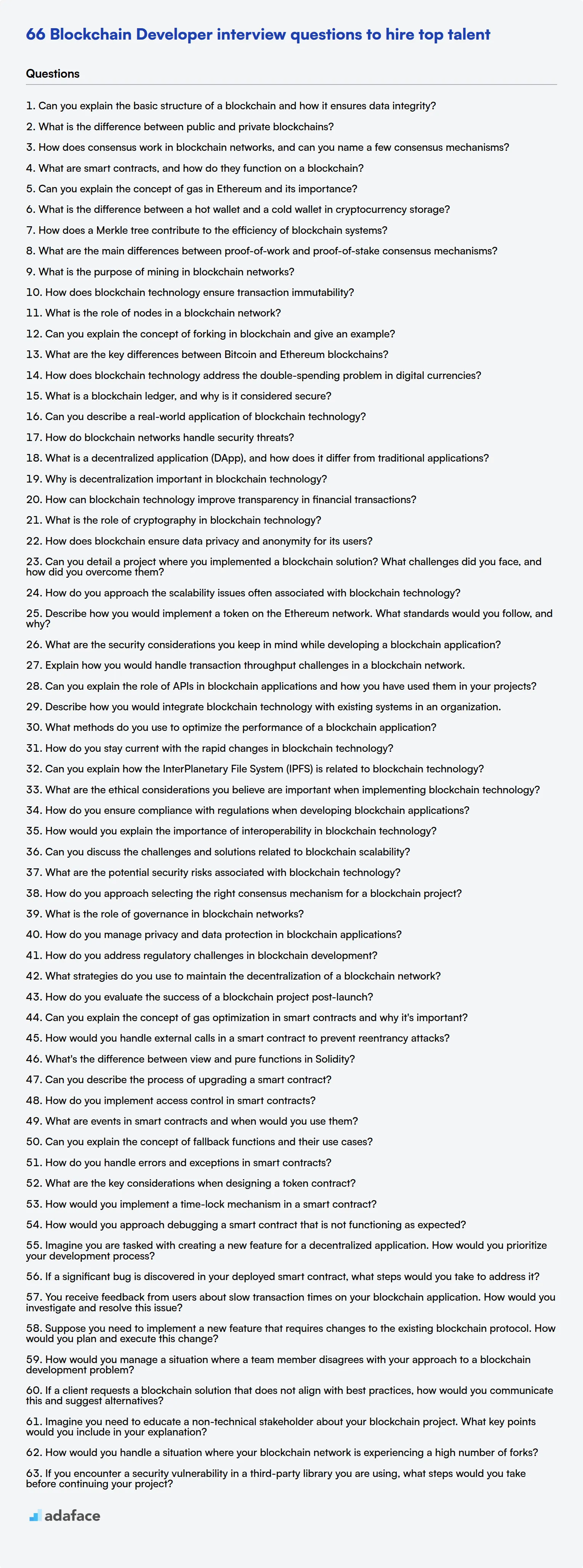Hiring a blockchain developer who truly understands the complex landscape of technology can be a daunting task. This list of interview questions aims to arm recruiters and hiring managers with the right tools to identify top talent swiftly.
This blog post explores a comprehensive list of blockchain developer interview questions segmented into categories for basic, junior, intermediate, advanced candidates and beyond. You'll find targeted questions for smart contracts and situational queries designed to gauge knowledge and problem-solving skills within the blockchain domain.
Utilizing this guide ensures you can pinpoint the best candidates for your team, enhancing the selection process. For added assurance, consider using our blockchain developer online test before the interview stage to streamline your hiring process.
Table of contents
15 basic Blockchain Developer interview questions and answers to assess candidates
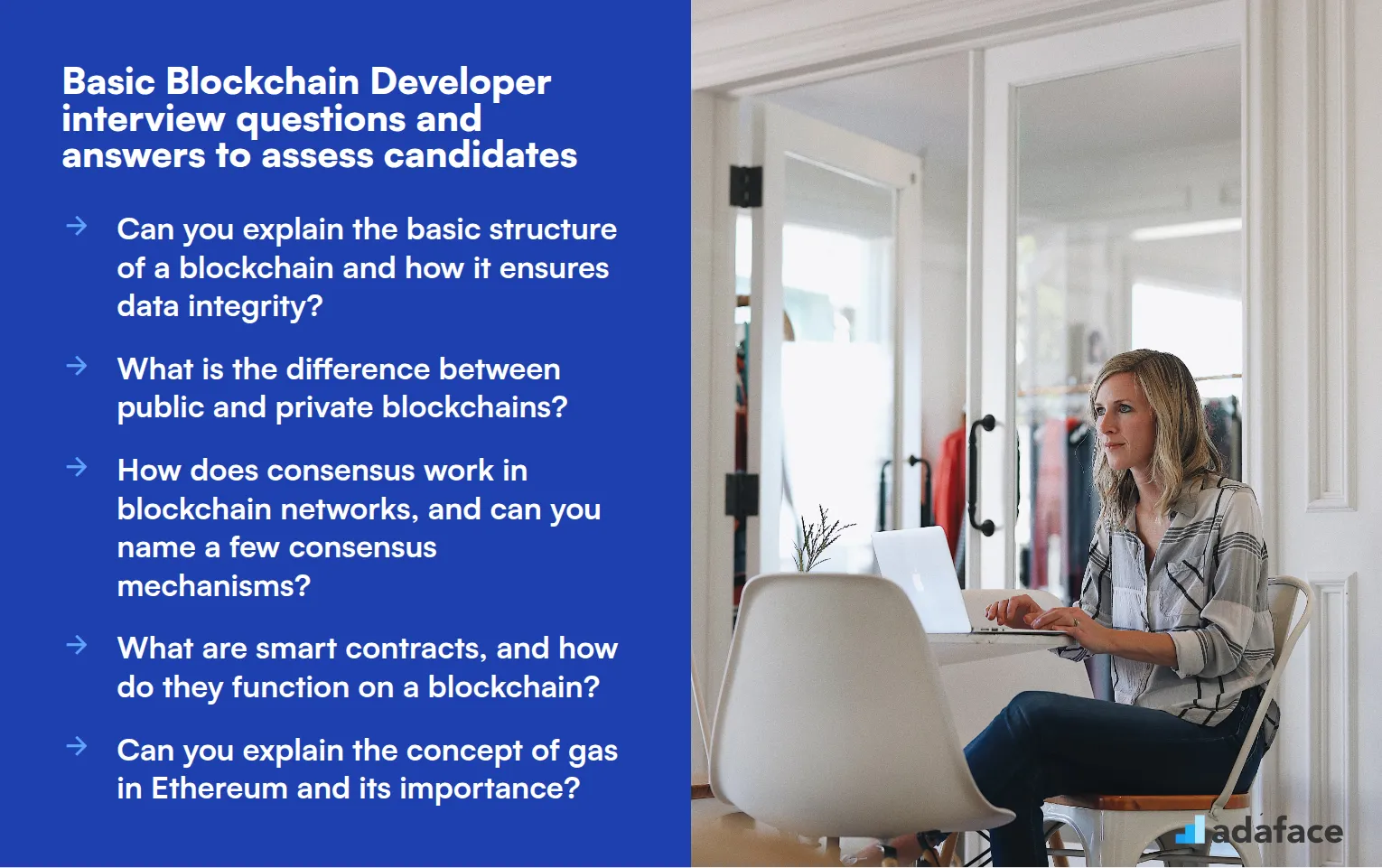
To effectively assess blockchain developer candidates, use these 15 basic interview questions. These questions are designed to evaluate a candidate's fundamental understanding of blockchain technology, smart contracts, and related concepts. Use them to gauge the applicant's knowledge and problem-solving skills in a blockchain context.
- Can you explain the basic structure of a blockchain and how it ensures data integrity?
- What is the difference between public and private blockchains?
- How does consensus work in blockchain networks, and can you name a few consensus mechanisms?
- What are smart contracts, and how do they function on a blockchain?
- Can you explain the concept of gas in Ethereum and its importance?
- What is the difference between a hot wallet and a cold wallet in cryptocurrency storage?
- How does a Merkle tree contribute to the efficiency of blockchain systems?
- What are the main differences between proof-of-work and proof-of-stake consensus mechanisms?
- Can you explain what a 51% attack is and how it could affect a blockchain network?
- What is the purpose of mining in blockchain networks?
- How does blockchain technology ensure transaction immutability?
- What is the role of nodes in a blockchain network?
- Can you explain the concept of forking in blockchain and give an example?
- What are the key differences between Bitcoin and Ethereum blockchains?
- How does blockchain technology address the double-spending problem in digital currencies?
8 Blockchain Developer interview questions and answers to evaluate junior developers
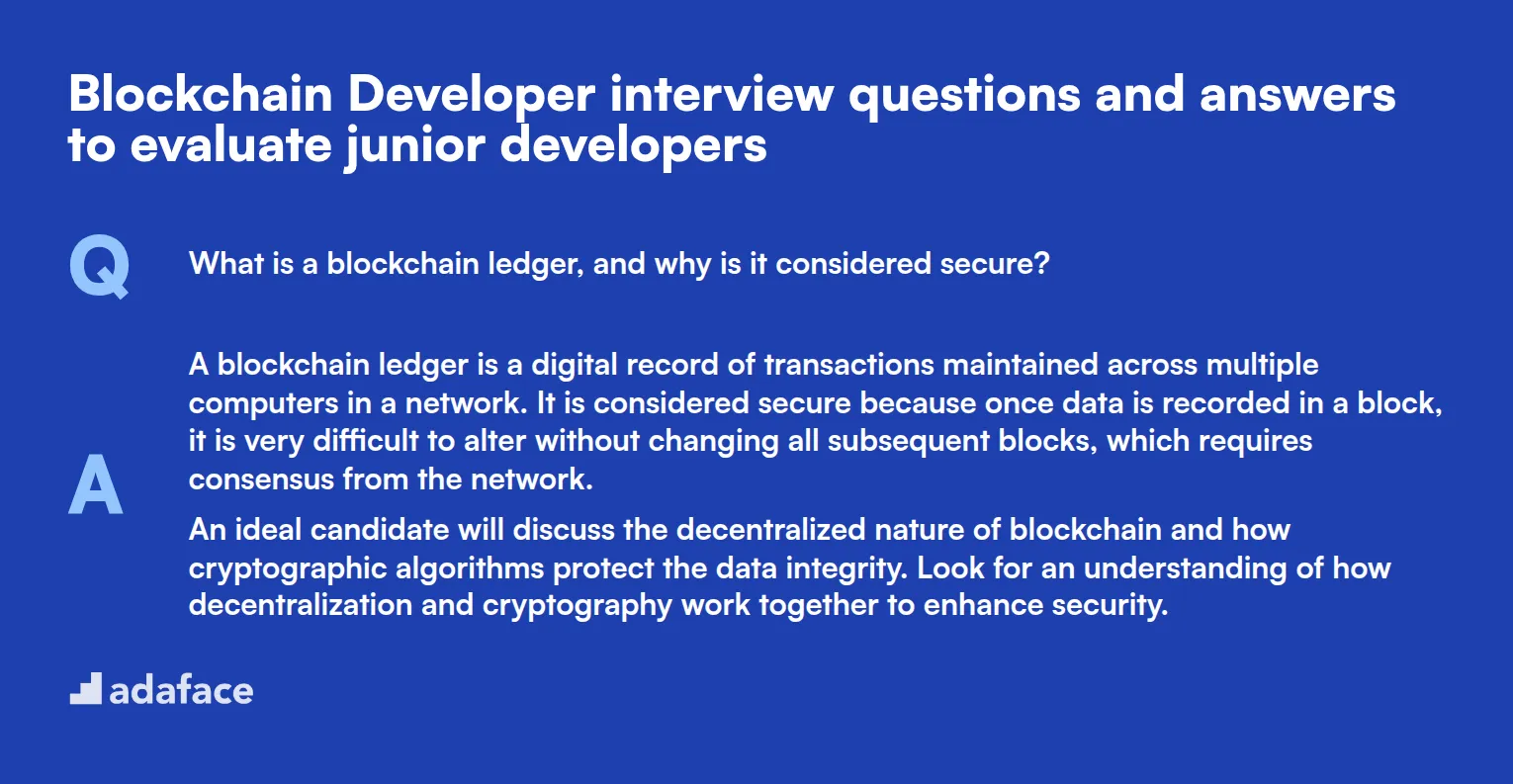
To determine if your junior blockchain developer candidates have a solid foundation in blockchain technology, use these interview questions. They are designed to uncover the candidate's understanding of essential concepts, which are crucial for any successful blockchain project.
1. What is a blockchain ledger, and why is it considered secure?
A blockchain ledger is a digital record of transactions maintained across multiple computers in a network. It is considered secure because once data is recorded in a block, it is very difficult to alter without changing all subsequent blocks, which requires consensus from the network.
An ideal candidate will discuss the decentralized nature of blockchain and how cryptographic algorithms protect the data integrity. Look for an understanding of how decentralization and cryptography work together to enhance security.
2. Can you describe a real-world application of blockchain technology?
One real-world application of blockchain technology is in supply chain management. Blockchain can improve transparency and traceability by providing a secure and immutable record of every transaction across the supply chain, from the origin of raw materials to the delivery of finished goods.
Candidates should be able to relate how blockchain's features, like immutability and decentralization, enhance efficiency and trust in supply chains. Look for examples that demonstrate a clear understanding of blockchain's practical benefits.
3. How do blockchain networks handle security threats?
Blockchain networks handle security threats through various mechanisms such as consensus protocols, cryptographic algorithms, and regular auditing. These ensure that the network remains secure against unauthorized access and tampering.
Candidates should highlight the importance of consensus protocols and cryptographic security. Look for a discussion on how regular audits and vigilance against new threats contribute to overall network security.
4. What is a decentralized application (DApp), and how does it differ from traditional applications?
A decentralized application (DApp) runs on a blockchain network rather than a centralized server. Unlike traditional applications, DApps are open-source, have no single point of failure, and often incorporate smart contracts to execute functions automatically.
Look for candidates who can distinguish between the centralized nature of traditional apps and the decentralized, peer-to-peer architecture of DApps. They should also mention the role of smart contracts in automating processes within DApps.
5. Why is decentralization important in blockchain technology?
Decentralization is crucial in blockchain as it removes the need for a central authority, reducing the risk of corruption and censorship. It ensures that no single entity has control over the entire network, enhancing security and fairness.
An ideal candidate will articulate the benefits of decentralization in terms of increased security, transparency, and user empowerment. They should also discuss how decentralization mitigates risks associated with centralized control.
6. How can blockchain technology improve transparency in financial transactions?
Blockchain technology improves transparency in financial transactions by providing a publicly accessible ledger where all transaction data is recorded and verified. This prevents fraudulent activities and allows for greater accountability.
Candidates should explain how the immutability and public availability of blockchain data ensure that all parties can verify transactions independently. Look for an understanding of how transparency builds trust within financial systems.
7. What is the role of cryptography in blockchain technology?
Cryptography plays a vital role in blockchain by securing the data stored on the ledger. It ensures that transactions are encrypted and only accessible to authorized users, maintaining integrity and confidentiality.
Look for candidates who can explain how cryptographic techniques protect data and ensure privacy. They should demonstrate an understanding of how encryption and hashing work within blockchain systems.
8. How does blockchain ensure data privacy and anonymity for its users?
Blockchain ensures data privacy and anonymity through cryptographic methods that allow users to transact without revealing their identities. Transactions are linked to cryptographic keys instead of personal information, ensuring anonymity.
An ideal candidate will highlight how public and private keys contribute to privacy. They should also discuss the balance between transparency and privacy that blockchain technology achieves.
12 intermediate Blockchain Developer interview questions and answers to ask mid-tier developers
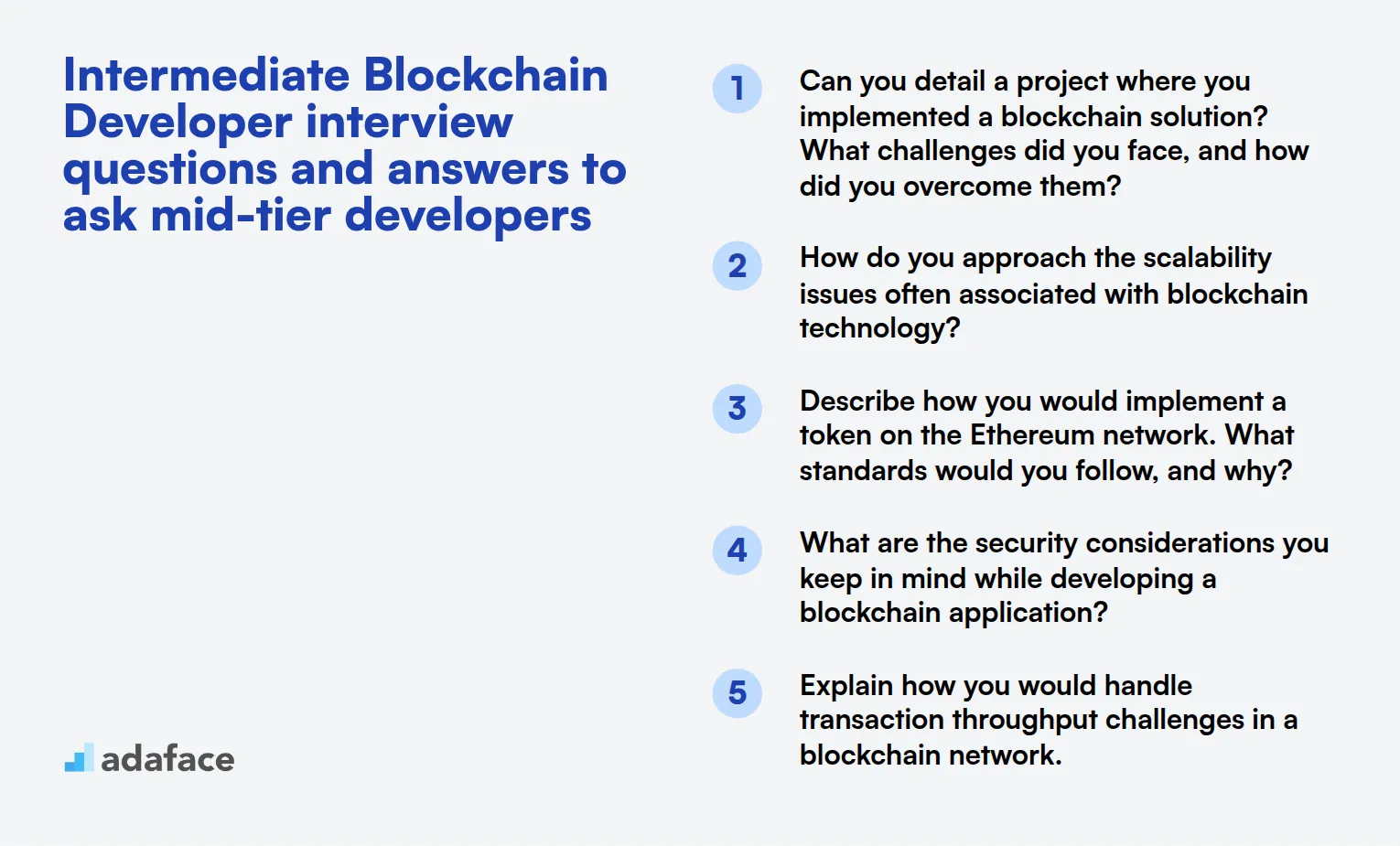
To ensure your candidates possess the right level of expertise in blockchain technology, consider using these intermediate interview questions. They are designed to evaluate the skills and knowledge of mid-tier developers, helping you find the perfect fit for your blockchain developer job description.
- Can you detail a project where you implemented a blockchain solution? What challenges did you face, and how did you overcome them?
- How do you approach the scalability issues often associated with blockchain technology?
- Describe how you would implement a token on the Ethereum network. What standards would you follow, and why?
- What are the security considerations you keep in mind while developing a blockchain application?
- Explain how you would handle transaction throughput challenges in a blockchain network.
- Can you explain the role of APIs in blockchain applications and how you have used them in your projects?
- Describe how you would integrate blockchain technology with existing systems in an organization.
- What methods do you use to optimize the performance of a blockchain application?
- How do you stay current with the rapid changes in blockchain technology?
- Can you explain how the InterPlanetary File System (IPFS) is related to blockchain technology?
- What are the ethical considerations you believe are important when implementing blockchain technology?
- How do you ensure compliance with regulations when developing blockchain applications?
9 advanced Blockchain Developer interview questions and answers to evaluate senior developers
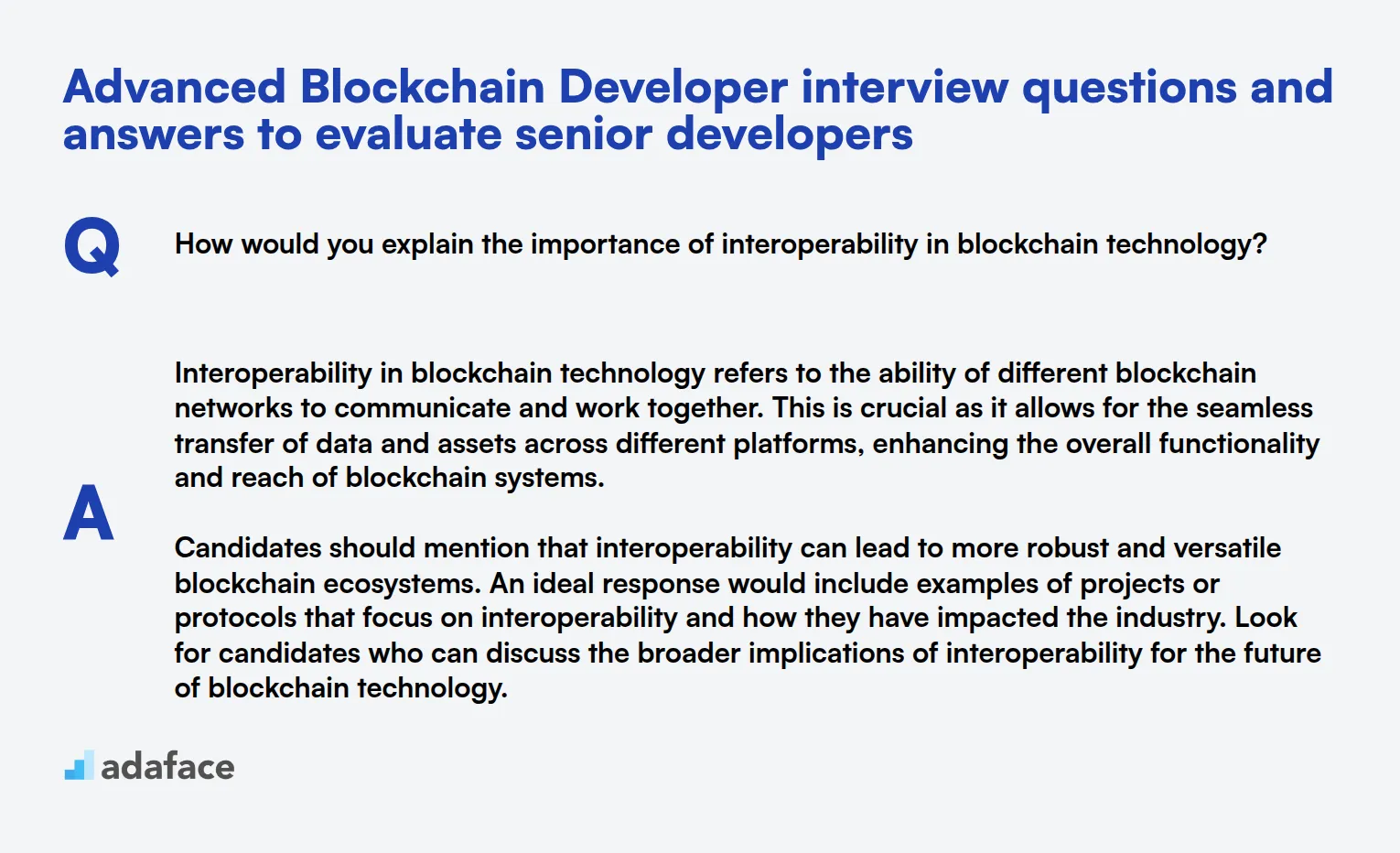
When it comes to interviewing senior blockchain developers, you need questions that dig deeper than the basics. This list of advanced interview questions will help you uncover a candidate's true expertise and problem-solving abilities. Use them to determine if your applicant has the chops to tackle complex blockchain projects.
1. How would you explain the importance of interoperability in blockchain technology?
Interoperability in blockchain technology refers to the ability of different blockchain networks to communicate and work together. This is crucial as it allows for the seamless transfer of data and assets across different platforms, enhancing the overall functionality and reach of blockchain systems.
Candidates should mention that interoperability can lead to more robust and versatile blockchain ecosystems. An ideal response would include examples of projects or protocols that focus on interoperability and how they have impacted the industry. Look for candidates who can discuss the broader implications of interoperability for the future of blockchain technology.
2. Can you discuss the challenges and solutions related to blockchain scalability?
Scalability is a significant challenge in blockchain technology as it concerns the ability to handle a growing amount of work or its potential to accommodate growth. Common scalability issues include slow transaction speeds and high energy consumption.
Candidates might mention solutions like layer 2 scaling solutions, sharding, or off-chain transactions. An ideal candidate will not only describe these solutions but also discuss their pros and cons. Look for those who can critically evaluate these methods and suggest when one might be preferable over another.
3. What are the potential security risks associated with blockchain technology?
While blockchain is often touted for its security, it is not entirely immune to risks. Potential threats include 51% attacks, double-spending, and vulnerabilities in smart contracts. Understanding these risks is crucial for any blockchain developer.
Look for candidates who can discuss specific security measures they have implemented in their projects. An ideal candidate should be able to explain how these risks can impact a network and propose practical solutions to mitigate them. Consider assessing their understanding of security strategies in blockchain development.
4. How do you approach selecting the right consensus mechanism for a blockchain project?
Selecting the right consensus mechanism depends on several factors, such as the nature of the project, its goals, and its security requirements. Common mechanisms include Proof of Work, Proof of Stake, and Delegated Proof of Stake, each with its own advantages and limitations.
Candidates should evaluate the trade-offs between speed, security, and energy efficiency. An ideal answer will include examples of projects they have worked on and why a particular consensus mechanism was chosen. Look for candidates who can articulate the reasoning behind their choices and how they align with project objectives.
5. What is the role of governance in blockchain networks?
Governance in blockchain networks refers to the processes through which decisions are made and implemented. This includes rules about how the network operates, who has the power to make changes, and how disputes are resolved.
Candidates should explain that effective governance mechanisms can help maintain network integrity and adapt to new challenges. Look for responses that include examples of governance models, such as on-chain and off-chain governance, and discuss their effectiveness. Ideal candidates will highlight the importance of transparency and community participation in governance.
6. How do you manage privacy and data protection in blockchain applications?
Privacy and data protection involve ensuring that sensitive information is not disclosed without authorization. In blockchain, this can be particularly challenging due to the transparent nature of many networks.
Candidates might discuss the use of technologies such as zero-knowledge proofs or ring signatures to enhance privacy. An ideal answer will include examples of how these technologies can be implemented and their impact on data protection. Look for candidates who demonstrate an understanding of the balance between transparency and privacy in blockchain applications.
7. How do you address regulatory challenges in blockchain development?
Regulatory challenges in blockchain involve navigating the complex and evolving legal landscape. Developers need to ensure compliance with relevant laws and regulations, which can vary significantly by jurisdiction.
Candidates should speak about the importance of staying informed about regulatory changes and collaborating with legal experts. An ideal answer would include examples of projects where they have successfully navigated regulatory challenges. Look for candidates who can articulate strategies for ensuring compliance while maintaining innovation.
8. What strategies do you use to maintain the decentralization of a blockchain network?
Decentralization is a core tenet of blockchain, ensuring that no single entity has control over the network. Strategies to maintain decentralization include using a distributed network of nodes and implementing consensus mechanisms that discourage centralization.
Candidates should discuss the importance of community involvement and the distribution of network power. An ideal response will include examples of projects where they successfully maintained decentralization. Look for candidates who can explain the benefits of decentralization and how it contributes to the security and reliability of the network.
9. How do you evaluate the success of a blockchain project post-launch?
Evaluating the success of a blockchain project involves assessing various metrics such as user adoption, network activity, and any performance issues. It's important to track key performance indicators that align with the project's initial objectives.
Candidates should mention the importance of community feedback and ongoing development to address any shortcomings. An ideal candidate will provide examples of how they have measured success in past projects. Look for those who can articulate a clear plan for post-launch evaluation and continuous improvement.
10 Blockchain Developer interview questions about smart contracts

To assess a candidate's expertise in smart contracts, use these 10 interview questions. They'll help you gauge the applicant's understanding of smart contract development, security considerations, and best practices. These questions are designed to reveal both theoretical knowledge and practical experience.
- Can you explain the concept of gas optimization in smart contracts and why it's important?
- How would you handle external calls in a smart contract to prevent reentrancy attacks?
- What's the difference between view and pure functions in Solidity?
- Can you describe the process of upgrading a smart contract?
- How do you implement access control in smart contracts?
- What are events in smart contracts and when would you use them?
- Can you explain the concept of fallback functions and their use cases?
- How do you handle errors and exceptions in smart contracts?
- What are the key considerations when designing a token contract?
- How would you implement a time-lock mechanism in a smart contract?
12 situational Blockchain Developer interview questions for hiring top developers
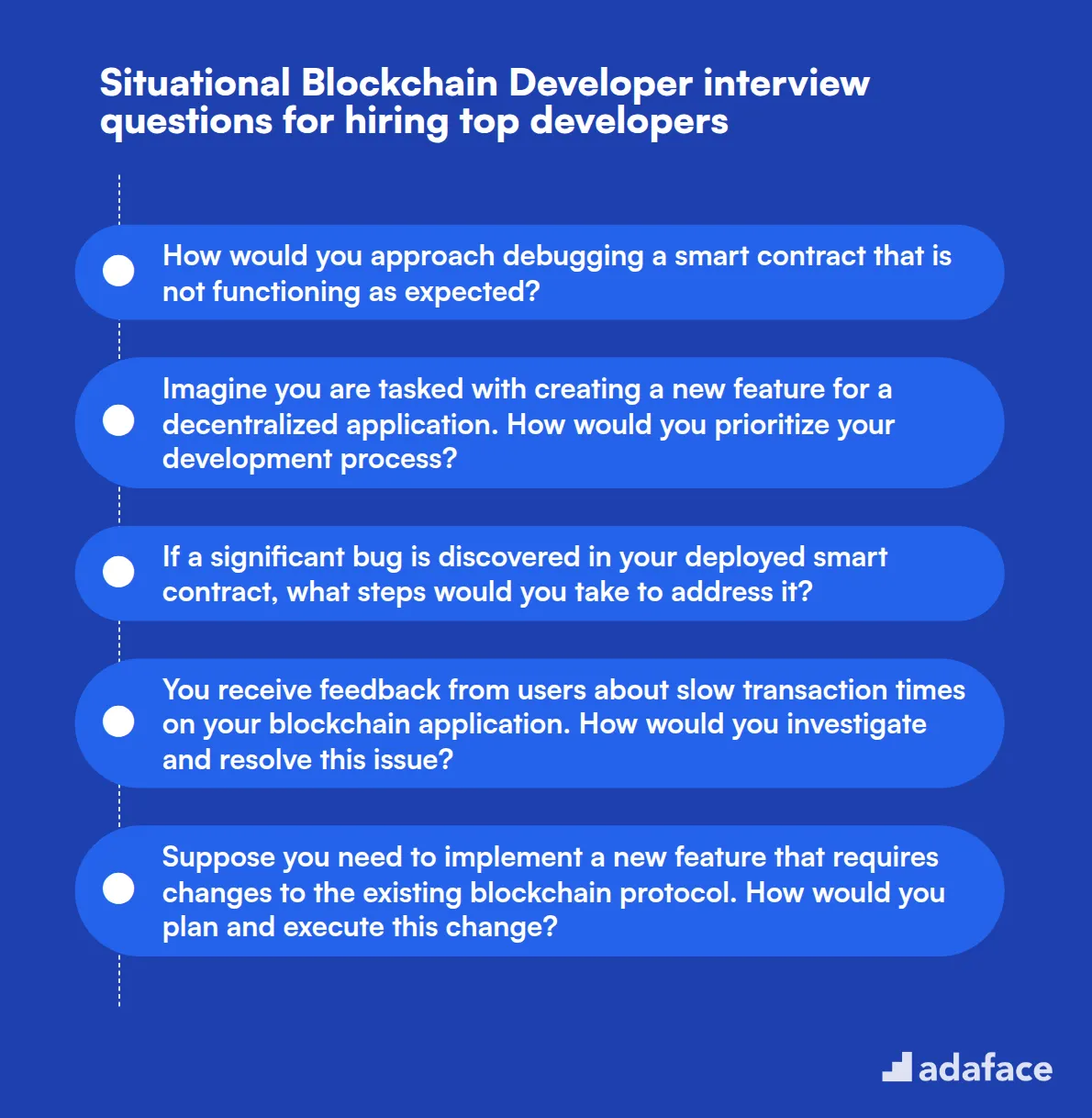
To assess whether candidates possess the necessary problem-solving skills and practical knowledge in blockchain development, consider using this list of situational interview questions. These questions are designed to reveal how applicants would handle real-world challenges they might face in their roles, ensuring you find the right fit for your team. For more details about the role, you can check out this blockchain developer job description.
- How would you approach debugging a smart contract that is not functioning as expected?
- Imagine you are tasked with creating a new feature for a decentralized application. How would you prioritize your development process?
- If a significant bug is discovered in your deployed smart contract, what steps would you take to address it?
- You receive feedback from users about slow transaction times on your blockchain application. How would you investigate and resolve this issue?
- Suppose you need to implement a new feature that requires changes to the existing blockchain protocol. How would you plan and execute this change?
- How would you manage a situation where a team member disagrees with your approach to a blockchain development problem?
- If a client requests a blockchain solution that does not align with best practices, how would you communicate this and suggest alternatives?
- Imagine you need to educate a non-technical stakeholder about your blockchain project. What key points would you include in your explanation?
- How would you handle a situation where your blockchain network is experiencing a high number of forks?
- If you encounter a security vulnerability in a third-party library you are using, what steps would you take before continuing your project?
Which Blockchain Developer skills should you evaluate during the interview phase?
While it's impossible to evaluate every aspect of a candidate's abilities in a single interview, focusing on core skills is crucial for Blockchain Developers. Here are the key areas to assess during the interview process:
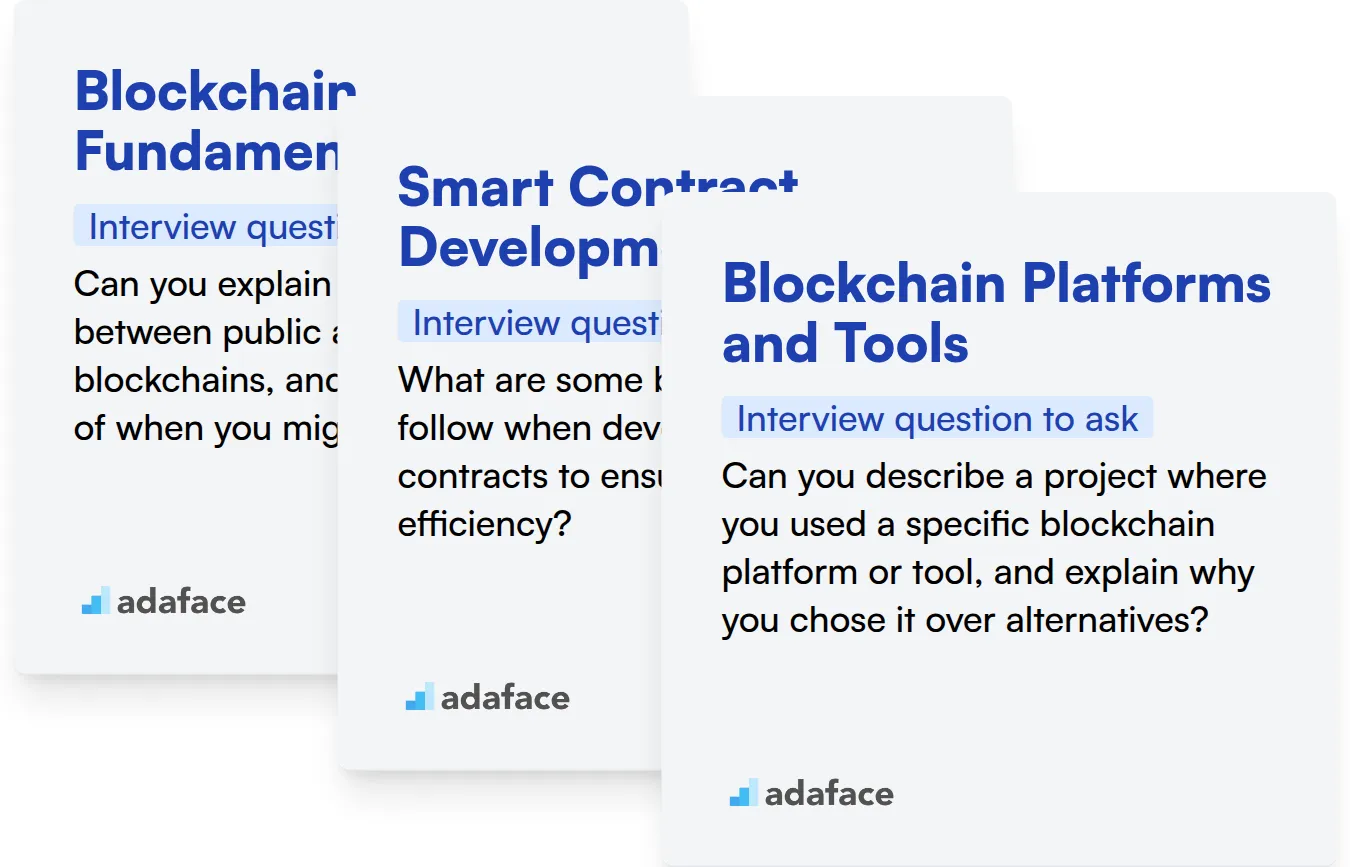
Blockchain Fundamentals
A solid understanding of blockchain technology is the foundation for any Blockchain Developer. This includes knowledge of distributed ledgers, consensus mechanisms, and cryptography.
Consider using a blockchain developer assessment test with relevant MCQs to evaluate candidates' grasp of blockchain concepts.
To assess this skill during the interview, you can ask targeted questions about blockchain fundamentals.
Can you explain the difference between public and private blockchains, and give an example of when you might use each?
Look for answers that demonstrate a clear understanding of the distinctions between public and private blockchains, including aspects like accessibility, scalability, and use cases.
Smart Contract Development
Proficiency in smart contract development is essential for Blockchain Developers. This skill involves writing, deploying, and testing smart contracts on various blockchain platforms.
You can use a coding test focused on Solidity or other relevant languages to evaluate candidates' smart contract development skills.
During the interview, ask a question that tests the candidate's understanding of smart contract development.
What are some best practices you follow when developing smart contracts to ensure security and efficiency?
Look for answers that mention practices such as code auditing, gas optimization, and handling of edge cases. The candidate should demonstrate awareness of common vulnerabilities and how to mitigate them.
Blockchain Platforms and Tools
Familiarity with various blockchain platforms and development tools is crucial. This includes experience with platforms like Ethereum, Hyperledger, or Corda, and tools like Truffle or Remix.
To assess this skill, you can ask about the candidate's experience with different blockchain platforms and tools.
Can you describe a project where you used a specific blockchain platform or tool, and explain why you chose it over alternatives?
Look for answers that demonstrate practical experience with blockchain platforms and tools. The candidate should be able to explain the strengths and weaknesses of different options and justify their choices based on project requirements.
Hire Top Blockchain Developer Talent with Adaface Skill Tests
When looking to hire a Blockchain Developer, it's important to ensure that candidates possess the right skills. This ensures that your team can effectively leverage blockchain technology.
The most reliable way to evaluate these skills is by using targeted skill tests. Consider using the Blockchain Developer Online Test or the Solidity Coding Test to accurately assess candidates.
By utilizing these tests, you can efficiently shortlist the best applicants and invite them for interviews. This approach saves time and helps maintain a high standard in your hiring process.
To get started, sign up on our platform at Adaface Sign Up or visit our Online Assessment Platform to explore more options.
Blockchain Developer Test
Download Blockchain Developer interview questions template in multiple formats
Blockchain Developer Interview Questions FAQs
A Blockchain Developer should have strong programming skills, understanding of cryptography, knowledge of distributed systems, familiarity with blockchain platforms, and experience with smart contracts.
You can assess a candidate's blockchain knowledge through technical questions, coding challenges, discussions about past projects, and scenario-based questions related to blockchain implementation.
Key topics include blockchain fundamentals, smart contracts, consensus mechanisms, cryptography, decentralized applications (dApps), and specific blockchain platforms like Ethereum or Hyperledger.
Use situational questions and coding challenges that simulate real-world blockchain scenarios to evaluate a developer's problem-solving approach and technical skills.
Senior Blockchain Developers typically have more experience, deeper understanding of blockchain architecture, leadership skills, and the ability to design complex blockchain solutions compared to junior developers.

40 min skill tests.
No trick questions.
Accurate shortlisting.
We make it easy for you to find the best candidates in your pipeline with a 40 min skills test.
Try for freeRelated posts
Free resources




